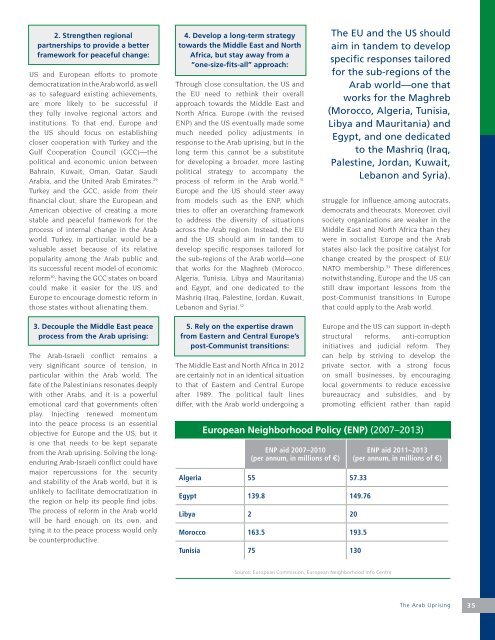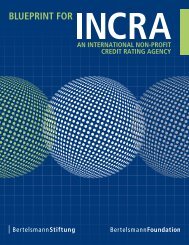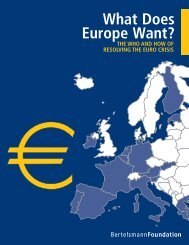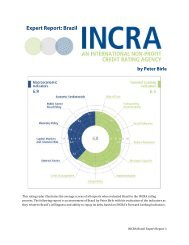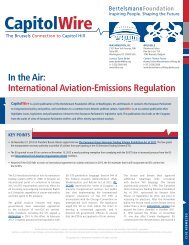BF-FieldManual-FEB13 -3.pdf - Bertelsmann Foundation
BF-FieldManual-FEB13 -3.pdf - Bertelsmann Foundation
BF-FieldManual-FEB13 -3.pdf - Bertelsmann Foundation
- No tags were found...
You also want an ePaper? Increase the reach of your titles
YUMPU automatically turns print PDFs into web optimized ePapers that Google loves.
2. Strengthen regionalpartnerships to provide a betterframework for peaceful change:US and European efforts to promotedemocratization in the Arab world, as wellas to safeguard existing achievements,are more likely to be successful ifthey fully involve regional actors andinstitutions. To that end, Europe andthe US should focus on establishingcloser cooperation with Turkey and theGulf Cooperation Council (GCC)—thepolitical and economic union betweenBahrain, Kuwait, Oman, Qatar, SaudiArabia, and the United Arab Emirates. 29Turkey and the GCC, aside from theirfinancial clout, share the European andAmerican objective of creating a morestable and peaceful framework for theprocess of internal change in the Arabworld. Turkey, in particular, would be avaluable asset because of its relativepopularity among the Arab public andits successful recent model of economicreform 30 ; having the GCC states on boardcould make it easier for the US andEurope to encourage domestic reform inthose states without alienating them.4. Develop a long-term strategytowards the Middle East and NorthAfrica, but stay away from a“one-size-fits-all” approach:Through close consultation, the US andthe EU need to rethink their overallapproach towards the Middle East andNorth Africa. Europe (with the revisedENP) and the US eventually made somemuch needed policy adjustments inresponse to the Arab uprising, but in thelong term this cannot be a substitutefor developing a broader, more lastingpolitical strategy to accompany theprocess of reform in the Arab world. 31Europe and the US should steer awayfrom models such as the ENP, whichtries to offer an overarching frameworkto address the diversity of situationsacross the Arab region. Instead, the EUand the US should aim in tandem todevelop specific responses tailored forthe sub-regions of the Arab world—onethat works for the Maghreb (Morocco,Algeria, Tunisia, Libya and Mauritania)and Egypt, and one dedicated to theMashriq (Iraq, Palestine, Jordan, Kuwait,Lebanon and Syria). 32The EU and the US shouldaim in tandem to developspecific responses tailoredfor the sub-regions of theArab world—one thatworks for the Maghreb(Morocco, Algeria, Tunisia,Libya and Mauritania) andEgypt, and one dedicatedto the Mashriq (Iraq,Palestine, Jordan, Kuwait,Lebanon and Syria).struggle for influence among autocrats,democrats and theocrats. Moreover, civilsociety organizations are weaker in theMiddle East and North Africa than theywere in socialist Europe and the Arabstates also lack the positive catalyst forchange created by the prospect of EU/NATO membership. 33 These differencesnotwithstanding, Europe and the US canstill draw important lessons from thepost-Communist transitions in Europethat could apply to the Arab world.3. Decouple the Middle East peaceprocess from the Arab uprising:The Arab-Israeli conflict remains avery significant source of tension, inparticular within the Arab world. Thefate of the Palestinians resonates deeplywith other Arabs, and it is a powerfulemotional card that governments oftenplay. Injecting renewed momentuminto the peace process is an essentialobjective for Europe and the US, but itis one that needs to be kept separatefrom the Arab uprising. Solving the longenduringArab-Israeli conflict could havemajor repercussions for the securityand stability of the Arab world, but it isunlikely to facilitate democratization inthe region or help its people find jobs.The process of reform in the Arab worldwill be hard enough on its own, andtying it to the peace process would onlybe counterproductive.5. Rely on the expertise drawnfrom Eastern and Central Europe’spost-Communist transitions:The Middle East and North Africa in 2012are certainly not in an identical situationto that of Eastern and Central Europeafter 1989. The political fault linesdiffer, with the Arab world undergoing aEurope and the US can support in-depthstructural reforms, anti-corruptioninitiatives and judicial reform. Theycan help by striving to develop theprivate sector, with a strong focuson small businesses, by encouraginglocal governments to reduce excessivebureaucracy and subsidies, and bypromoting efficient rather than rapidEuropean Neighborhood Policy (ENP) (2007–2013)ENP aid 2007–2010(per annum, in millions of €)Algeria 55 57.33Egypt 139.8 149.76Libya 2 20Morocco 163.5 193.5Tunisia 75 130ENP aid 2011–2013(per annum, in millions of €)Source: European Commission, European Neighborhood Info CentreThe Arab Uprising3 5


